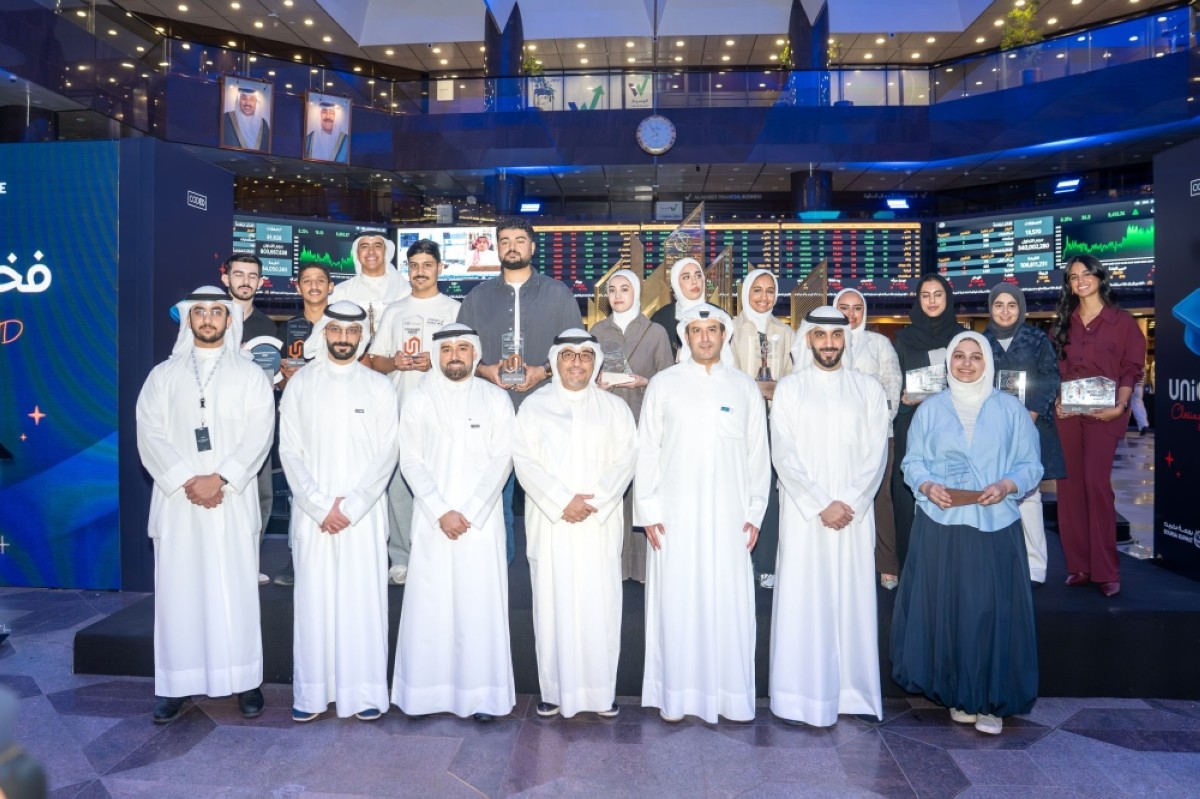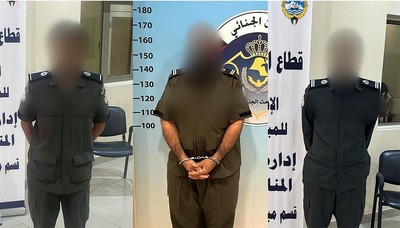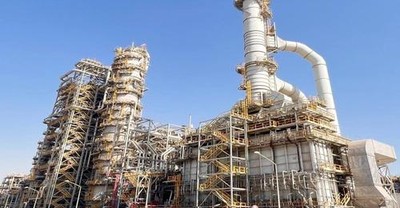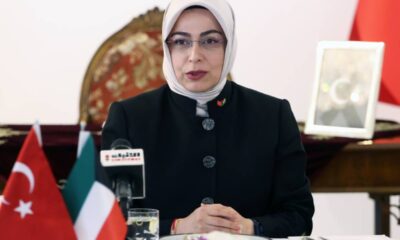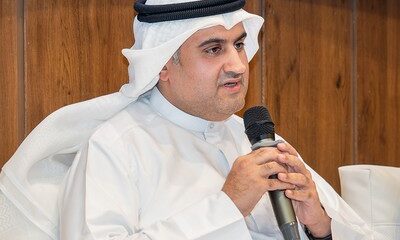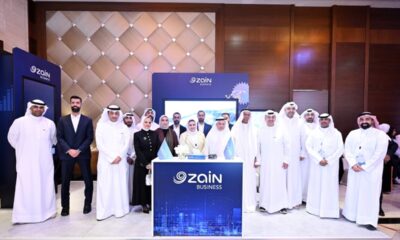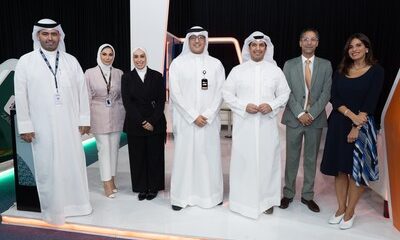KUWAIT: Boursa Kuwait successfully concluded its hosting of the fifth edition of UNICODE, an intensive cybersecurity, software development, and financial technology (FinTech) training program organized by CODED Academy with the bourse and the Kuwait Financial Center (Markaz) as strategic partners in the program. The achievement was marked by a graduation ceremony held in the Nasser Al-Kharafi/Jassim Al-Bahar Hall (Trading Hall) at Boursa Kuwait, celebrating 320 students who completed their three-month learning journey in the exchange’s modern training facilities.
The event was attended by distinguished leaders and representatives from the sponsoring and academic institutions, honoring the graduates who have joined the ranks of Kuwait’s promising talents in technology and innovation. Boursa Kuwait’s hosting and sponsorship of the program for the second consecutive year underscore its continued commitment to nurturing young national talents. The Kuwait Financial Center (Markaz) joined as a co-sponsor, highlighting the two institutions’ shared dedication to advancing technical education, empowering the next generation and equipping them with the modern skills and expertise demanded by today’s labor market and strengthening the nation’s competitiveness on both regional and global fronts.
Sponsorship and hosting this initiative also stem from a firm belief in the importance of technology in strengthening institutional efficiency and safeguarding business operations. Advanced technical knowledge plays a vital role in enhancing organizational security and ensuring the reliability of transactions, which can positively impact the stability of financial markets and reinforce investor confidence.
During the ceremony, Senior Director of Marketing and Corporate Communications at Boursa Kuwait, Naser Al-Sanousi, expressed his pride in the graduates, saying, “This ceremony marks the culmination of an intensive learning journey that participants pursued with passion and dedication alongside their academic and professional commitments over the course of three months. We are proud of their accomplishments, which reflect the ambition of Kuwaiti youth and their determination to develop their skills in the fields of financial technology and innovation. The graduates have demonstrated their ability to combine academic knowledge with practical application, embodying the spirit of perseverance and continuous learning and paving the way for future success and leadership.”
In its fifth edition, the program saw a notable expansion of its content, integrating financial technology (FinTech) and artificial intelligence (AI) concepts across all learning tracks. The curriculum included web development using HTML, CSS, and JavaScript, mobile application development through the Flutter framework, and cybersecurity fundamentals, designed to equip participants with the skills and confidence needed to thrive in today’s rapidly evolving digital job market.
“Boursa Kuwait is proud of its strategic partnership with CODED Academy, which underscores our commitment to empowering young people with the knowledge and skills that enhance the competitiveness and sustainability of the economy and support Kuwait’s national development. Our partnership also reflects our goal of investing in technical education to strengthen the digital transformation ecosystem within the capital market sector. Through its sponsorship of the UNICODE program, Boursa Kuwait aims to bridge the gap between academia and labor market needs by preparing a generation equipped with advanced financial and technological skills, in line with Kuwait’s vision to become a leading regional financial and investment hub,” added Al-Sanousi.
The strategic partnership between Boursa Kuwait and CODED Academy extends over two years, with UNICODE serving as a distinguished educational platform that combines academic knowledge with practical application. The program contributes to developing a generation that is financially aware and digitally empowered and is aligned with Boursa Kuwait’s efforts to promote financial literacy and awareness of capital markets, key pillars in the company’s corporate sustainability strategy.
“The partnership between Markaz, Boursa Kuwait, and CODED Academy reflects our shared vision for progress through knowledge, innovation, and social responsibility. Markaz is proud to be a long-term strategic partner of UNICODE, which continues to grow in both scope and impact. By supporting initiatives that combine financial literacy with innovation, we help empower Kuwaiti youth with the skills and capabilities demanded by modern economies, strengthening their ability to create value and drive progress, underscoring our firm belief that developing human capital is a cornerstone of economic diversification and sustainable growth in Kuwait,” said Managing Director of Investment Banking at Markaz, Ahmad Fouad AlFalah.
Established in 1974, the Kuwait Financial Center (Markaz) is a Kuwaiti financial institution specializing in asset management and investment banking services across the Middle East and North Africa region. It was listed in the Kuwaiti capital market in 1997. “We value our strategic partnership with Boursa Kuwait and the Kuwait Financial Center (Markaz), which stands as a model of productive collaboration that empowers youth with the capabilities to lead the future of technology in Kuwait.
UNICODE continues to embody the importance of combining education with hands-on experience in real-world work environments, and its fifth edition equipped participants with advanced technical skills that enable innovation and adaptability in today’s fast-paced digital economy. Hosting the program at Boursa Kuwait also provided an inspiring professional setting that reflects the realities of the financial sector, giving participants the ability to explore the growing role of technology in improving corporate efficiency and performance,” said CODED Academy Co-founder and Chief Operating Officer, Hashim Behbehani.
Since its launch in 2021, UNICODE has evolved from a promising pilot initiative into a leading platform for empowering Kuwaiti youth in technology and innovation. In 2024, the program’s fourth edition, the first sponsored by Boursa Kuwait, trained 250 university students and recent graduates at the exchange’s headquarters. The fifth edition expanded further to include 320 participants, bringing the total number of beneficiaries to over 570 students in just two years, a growth that reflects the program’s continued success and the strengthening partnership between Boursa Kuwait and CODED Academy.
Launched by CODED Academy in 2021, UNICODE aims to equip university students and recent graduates in Kuwait with the technical skills required by the labor market, seeking to empower national talents to keep pace with rapid digital transformation, enhance their capacity for innovation and excellence in modern work environments and contribute to the economic development and sustainable growth of Kuwait.
The program takes its name from the global Unicode encoding system, which assigns a unique digital identity to every character in the world’s languages, enabling universal communication across platforms and borders. The name was chosen to capture the spirit of the program, which aims to bring together generations through a shared language of technology and bridge classroom learning with real-world application in today’s connected digital world.
Boursa Kuwait’s corporate sustainability strategy is designed to ensure that all initiatives align with the company’s corporate social responsibility governance framework, industry best practices, and investor expectations. The strategy also emphasizes the establishment of strong and sustainable partnerships that contribute to Boursa Kuwait’s success, allowing the company to leverage the expertise and strengths of other organizations and institutions across various fields. Additionally, it seeks to integrate corporate social responsibility (CSR) efforts into the company’s culture, ensuring long-term sustainability and a lasting impact embedded within its daily operations.


